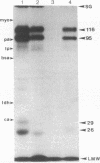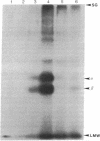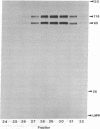Abstract
This report describes the structures of three distinct human melanoma surface antigens detected by monoclonal anti-melanoma antibodies. One antigen, expressed on all melanoma cells and on certain astrocytoma cells but not on any other kind of normal or tumor cell tested, has been shown to consist of our associated polypeptide chains. A second antigen expressed on many but not all melanomas has been identified as the antigenic product of the HLA-D locus, the DR antigen. A third protein antigen is not found on any normal cell tested but occurs on some, but not all, tumors of various origins.
Full text
PDF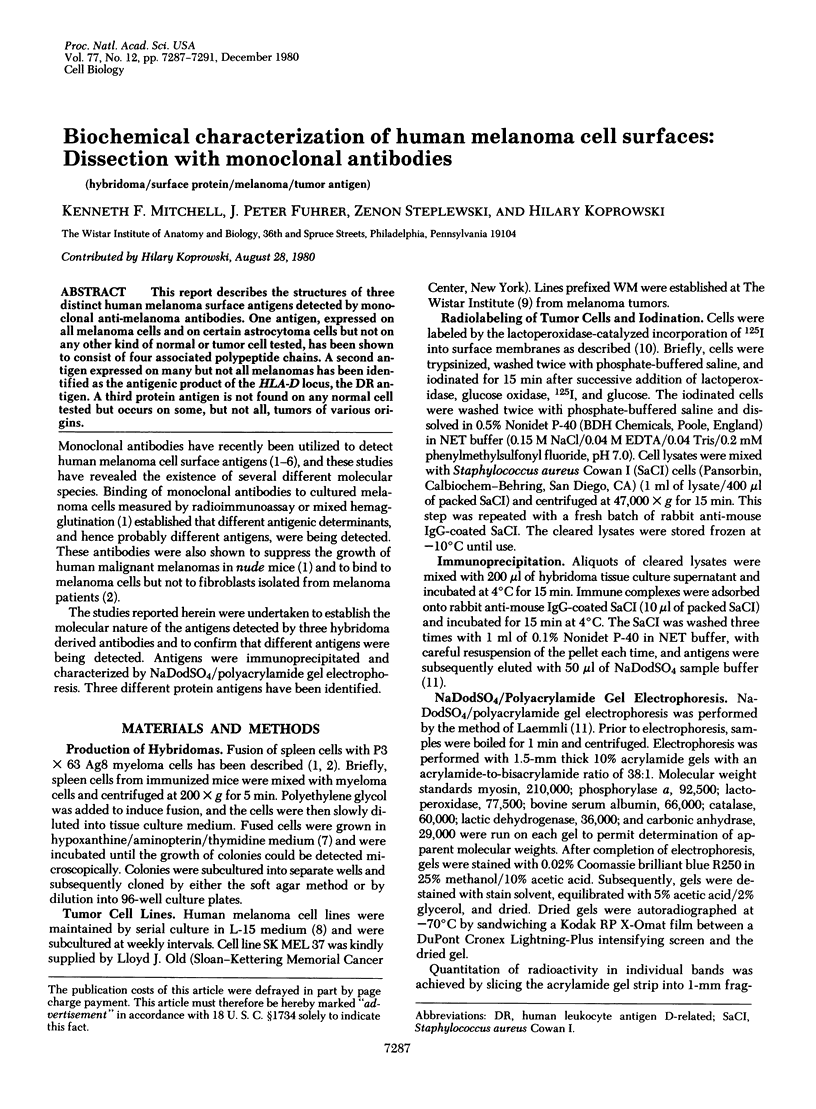
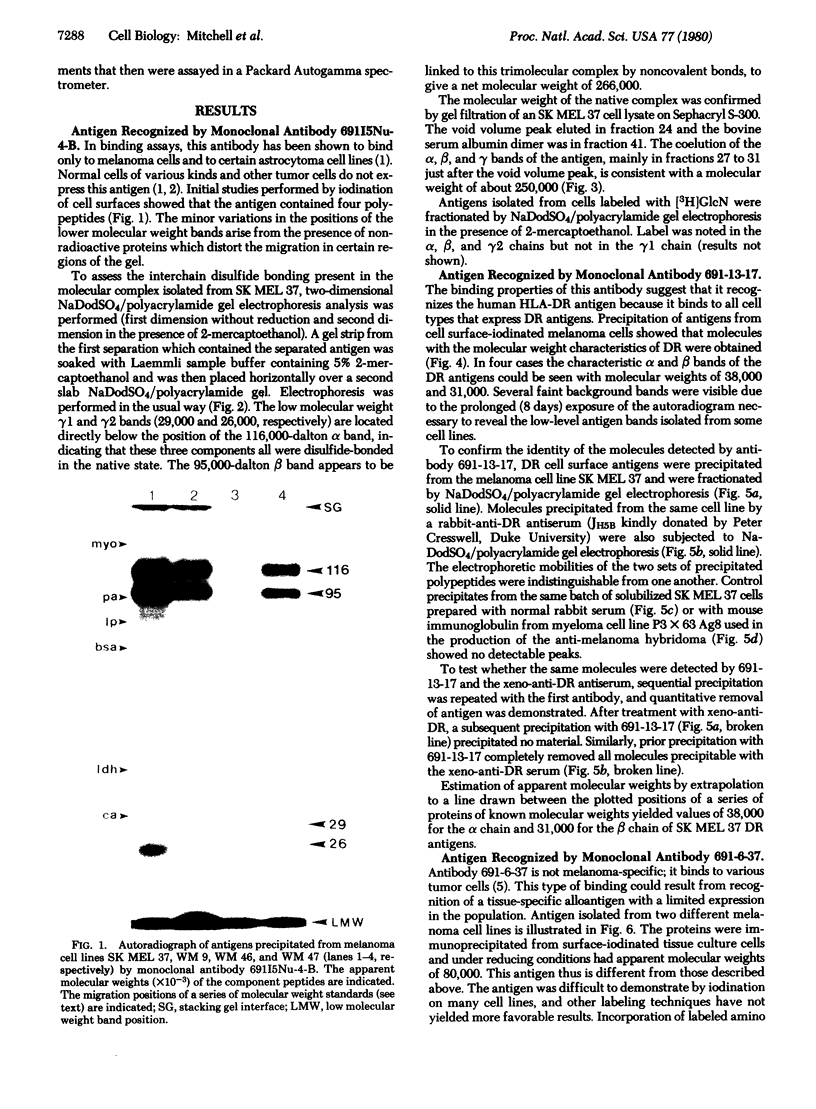
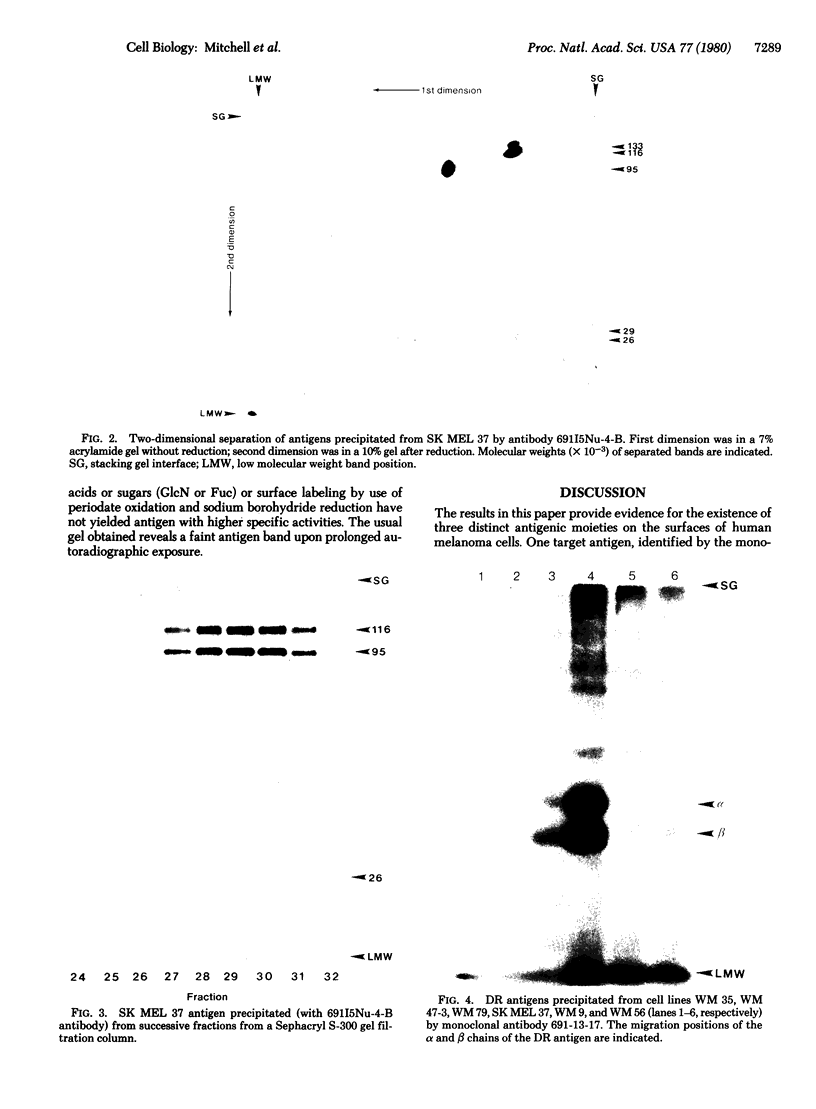
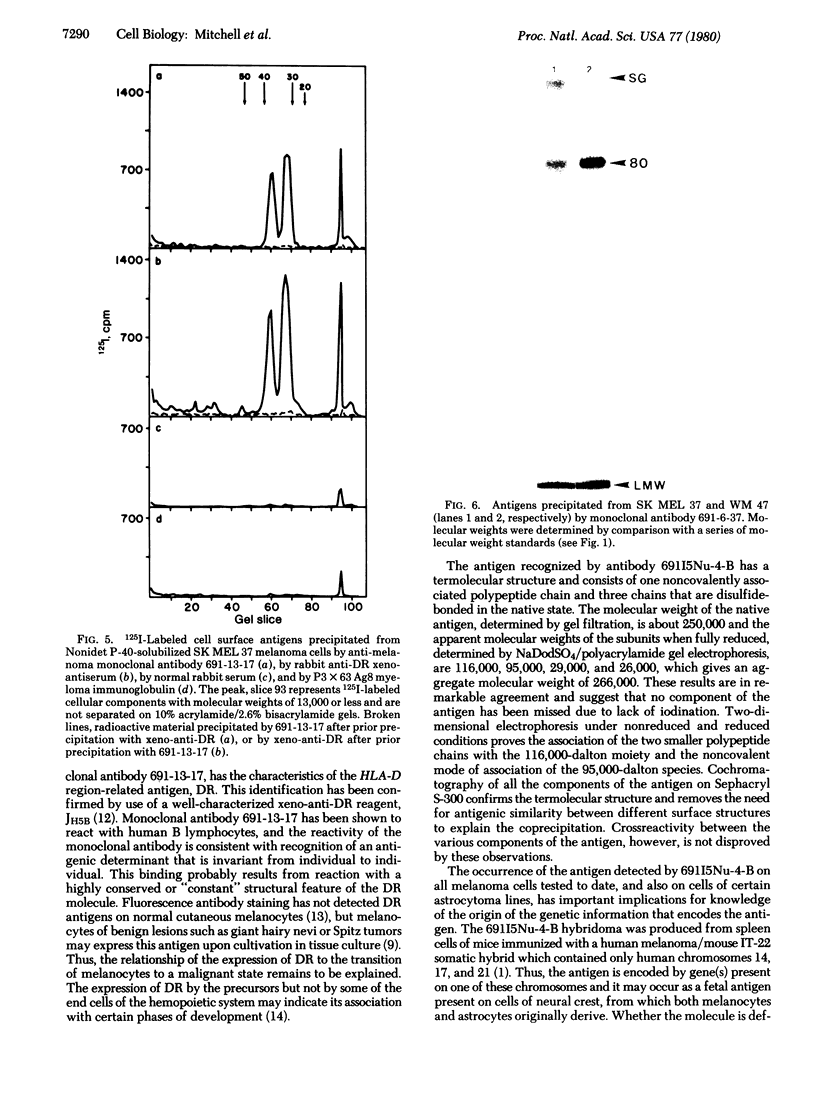
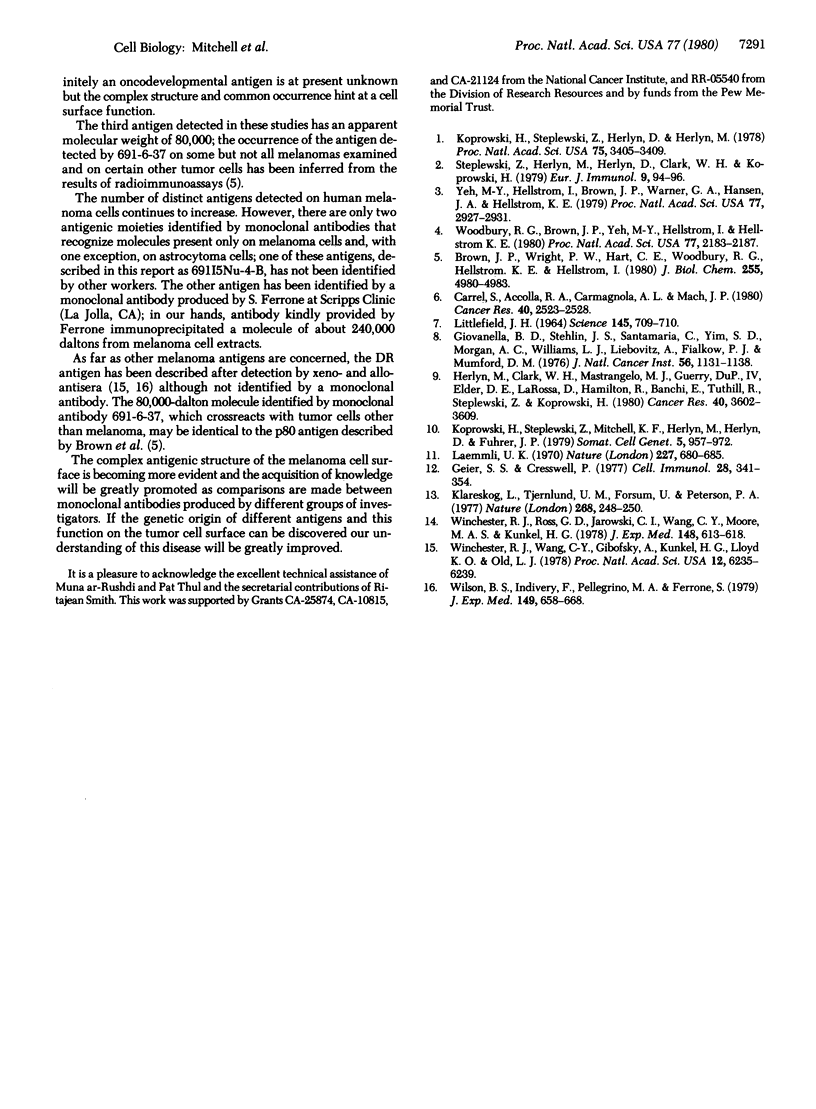
Images in this article
Selected References
These references are in PubMed. This may not be the complete list of references from this article.
- Brown J. P., Wright P. W., Hart C. E., Woodbury R. G., Hellström K. E., Hellström I. Protein antigens of normal and malignant human cells identified by immunoprecipitation with monoclonal antibodies. J Biol Chem. 1980 Jun 10;255(11):4980–4983. [PubMed] [Google Scholar]
- Carrel S., Accolla R. S., Carmagnola A. L., Mach J. P. Common human melanoma-associated antigen(s) detected by monoclonal antibodies. Cancer Res. 1980 Jul;40(7):2523–2528. [PubMed] [Google Scholar]
- Geier S. S., Cresswell P. Rabbit antisera to human B cell alloantigens: effects on the mixed lymphocyte response. Cell Immunol. 1977 Feb;28(2):341–354. doi: 10.1016/0008-8749(77)90117-4. [DOI] [PubMed] [Google Scholar]
- Glovanella B. C., Stehlin J. S., Santamaria C., Yim S. O., Morgan A. C., Williams L. J., Jr, Leibovitz A., Fialkow P. J., Mumford D. M. Human neoplastic and normal cells in tissue culture. I. Cell lines derived from malignant melanomas and normal melanocytes. J Natl Cancer Inst. 1976 Jun;56(6):1131–1142. doi: 10.1093/jnci/56.6.1131. [DOI] [PubMed] [Google Scholar]
- Herlyn M., Clark W. H., Jr, Mastrangelo M. J., Guerry D. P., 4th, Elder D. E., LaRossa D., Hamilton R., Bondi E., Tuthill R., Steplewski Z. Specific immunoreactivity of hybridoma-secreted monoclonal anti-melanoma antibodies to cultured cells and freshly derived human cells. Cancer Res. 1980 Oct;40(10):3602–3609. [PubMed] [Google Scholar]
- Klareskog L., Tjernlund U., Forsum U., Peterson P. A. Epidermal Langerhans cells express Ia antigens. Nature. 1977 Jul 21;268(5617):248–250. doi: 10.1038/268248a0. [DOI] [PubMed] [Google Scholar]
- Koprowski H., Steplewski Z., Herlyn D., Herlyn M. Study of antibodies against human melanoma produced by somatic cell hybrids. Proc Natl Acad Sci U S A. 1978 Jul;75(7):3405–3409. doi: 10.1073/pnas.75.7.3405. [DOI] [PMC free article] [PubMed] [Google Scholar]
- Koprowski H., Steplewski Z., Mitchell K., Herlyn M., Herlyn D., Fuhrer P. Colorectal carcinoma antigens detected by hybridoma antibodies. Somatic Cell Genet. 1979 Nov;5(6):957–971. doi: 10.1007/BF01542654. [DOI] [PubMed] [Google Scholar]
- LITTLEFIELD J. W. SELECTION OF HYBRIDS FROM MATINGS OF FIBROBLASTS IN VITRO AND THEIR PRESUMED RECOMBINANTS. Science. 1964 Aug 14;145(3633):709–710. doi: 10.1126/science.145.3633.709. [DOI] [PubMed] [Google Scholar]
- Laemmli U. K. Cleavage of structural proteins during the assembly of the head of bacteriophage T4. Nature. 1970 Aug 15;227(5259):680–685. doi: 10.1038/227680a0. [DOI] [PubMed] [Google Scholar]
- Steplewski Z., Herlyn M., Herlyn D., Clark W. H., Koprowski H. Reactivity of monoclonal anti-melanoma antibodies with melanoma cells freshly isolated from primary and metastatic melanoma. Eur J Immunol. 1979 Jan;9(1):94–96. doi: 10.1002/eji.1830090120. [DOI] [PubMed] [Google Scholar]
- Wilson B. S., Indiveri F., Pellegrino M. A., Ferrone S. DR (Ia-like) antigens on human melanoma cells. Serological detection and immunochemical characterization. J Exp Med. 1979 Mar 1;149(3):658–668. doi: 10.1084/jem.149.3.658. [DOI] [PMC free article] [PubMed] [Google Scholar]
- Winchester R. J., Meyers P. A., Broxmeyer H. E., Wang C. Y., Moore M. A., Kunkel H. G. Inhibition of human erythropoietic colony formation in culture by treatment with Ia antisera. J Exp Med. 1978 Aug 1;148(2):613–618. doi: 10.1084/jem.148.2.613. [DOI] [PMC free article] [PubMed] [Google Scholar]
- Winchester R. J., Wang C. Y., Gibofsky A., Kunkel H. G., Lloyd K. O., Old L. J. Expression of Ia-like antigens on cultured human malignant melanoma cell lines. Proc Natl Acad Sci U S A. 1978 Dec;75(12):6235–6239. doi: 10.1073/pnas.75.12.6235. [DOI] [PMC free article] [PubMed] [Google Scholar]
- Woodbury R. G., Brown J. P., Yeh M. Y., Hellström I., Hellström K. E. Identification of a cell surface protein, p97, in human melanomas and certain other neoplasms. Proc Natl Acad Sci U S A. 1980 Apr;77(4):2183–2187. doi: 10.1073/pnas.77.4.2183. [DOI] [PMC free article] [PubMed] [Google Scholar]
- Yeh M. Y., Hellström I., Brown J. P., Warner G. A., Hansen J. A., Hellström K. E. Cell surface antigens of human melanoma identified by monoclonal antibody. Proc Natl Acad Sci U S A. 1979 Jun;76(6):2927–2931. doi: 10.1073/pnas.76.6.2927. [DOI] [PMC free article] [PubMed] [Google Scholar]



